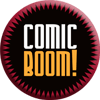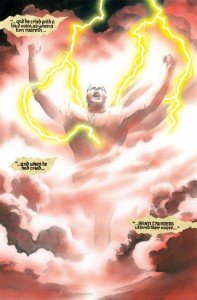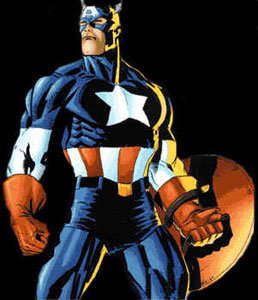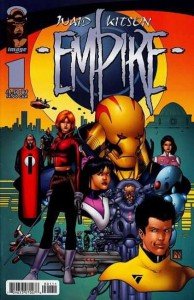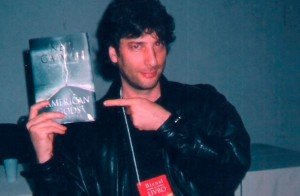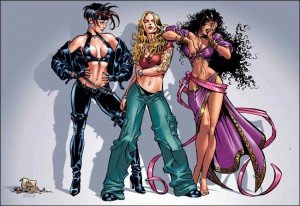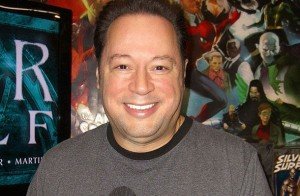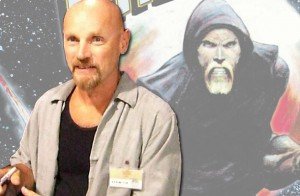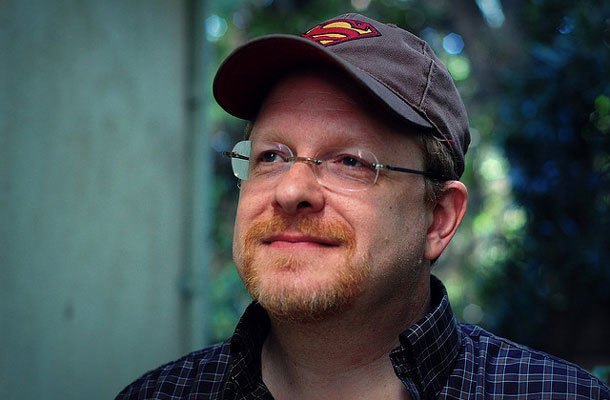
Text… Pages… Action! Signed by Mark Waid!
One of the greatest super-hero writers of our time, talks in an EXCLUSIVEinterview to Universo HQ about his future projects, his career, the characters he likes the most, the differences between Marvel and DC and much more
 He’s the man that killed Captain Marvel, in the Kingdom Come mini series.
He’s the man that killed Captain Marvel, in the Kingdom Come mini series.
The Flash had his best run under his writing.
Thanks to his elaborate and creative plots Captain America had his first good moment in a long while.
In his hands Ka-Zar stopped being a supporting cast character returning to his rightful position within the Marvel Universe.
He’s one of Gorilla Comics Gorilla Comics owners.
He just signed an exclusive contract with CrossGen Comics.
Once he said the superhero genre were in crisis because people are reading the same stories they read in the 30s.
If you still haven’t guessed whom are we talking about (which is unlikely), the above cited creator is Mark Waid, one of the best superhero writers of our time.
On this first anniversary of Universo HQ (01/05/2001), you’re the one who get the gift: anEXCLUSIVE interview, where he talks about his career, of his future projects, the differences between working for Marvel and DC, and… Hey, wait! How about we go right to the interview?
Have fun!
UHQ: You started as a free lancing writer for magazines like Amazing Heroes and Comic Buyer’s Guide. How did you made the change from those magazines to comics?
Mark Waid: Working on fan magazines allowed me constant contact with the editors and writers of the actual comics. That luck — what we call “networking” in America — allowed me to become fairly well known to them, so that when I walked into editor Julie Schwartz’s office in 1984 to pitch a Superman story, he and I already knew one another — meaning that he was more likely to listen to me and give me a chance. Everything else grew out of that.
UHQ: The Chain Lightning story arc will be published on January in Brazil, in a 160 pages special edition. Can you tell to the Brazilian reader’s something else about that and how that will affect Wally? Did you like what was done in this story?
Waid: : I very much like what was done in this story. In retrospect, the “Cobalt Blue” prologue is something I regret — his origins weren’t accepted very well (or politely) by American fans — butChain Lightning allowed me the chance to explore something that hadn’t yet been touched upon, which was Wally’s reaction to seeing Barry again now that Wally is not only no longer his sidekick, but more powerful and more knowledgeable than Barry EVER was.
UHQ: You worked on Flash for 8 years, and it wouldn’t be an exaggeration to say that you defined Wally’s persona and his whole universe. How do you see Flash today and why you left the title?
Waid: How I see Flash today is WHY I left the title, frankly. When I came to the book eight years ago, I saw many, many parallels in our lives and thus the chance for me to work out many of my own problems through Wally — my remoteness to my family, my frustrations about never being able to move fast enough or accomplish enough, my inability to enjoy a truly intimate relationship with a woman.
The good news is, both Wally and I have worked much of that out. The bad news is, it’s left Wally in a place where I no longer relate to him as strongly. We’ve “grown apart” — and thus I no longer have as much to say “through” him. He’s no longer an appropriate vehicle for me as a writer through which to continue to explore myself.
UHQ: Currently you’re writing the JLA. Is there something special in stock for Flash?
Waid: Ha! Not really — though it’s hard to resist the urge to have him save the day all the time!
UHQ: Let’s talk about Superman. You, Grant Morrison, Mark Millar and Tom Peyer offered a project for DC Comics and it was refused. What do you really wanted to do? And why DC refused it?
Waid: I’ll never be fully privy to DC’s reasons. The stated reasons made no sense to me and still don’t. I fear a lot of it had to do with DC’s strained relationship with Grant and their sometimes strained relationship with me. So far as what we wanted to do, I can’t be specific, as the four of us have made a pact to sit on many of these ideas and concepts in the hopes that they might come to fruition SOMEWHERE in the future.
Rest assured, though, that the primary objective was to restore Superman to what Siegel and Shuster conceived him as — meaning to once more emphasize the “Super” above the “Man,” rather than vice-versa.
UHQ: DC once said that no “superstar” would work on the monthly Superman books. What did you thought of that statement? Isn’t this a demerit for the current professionals that work with the Man of Steel?
Waid: Only if you take DC’s statement seriously. I’m not sure that’s what they meant. I’m not sure at all what they meant, period.
UHQ: Once you said that you decided to work with comics after watching Superman: The Movie three times. Is that the source of your admiration for the character?
Waid: Largely, yes. I always liked Superman growing up, always followed his comics, but Christopher Reeve’s portrayal of Superman truly communicated to me for the first time the sense of wonder and grandeur of the character, gave me a peek at the humanity inside of Superman. His Superman’s nobility and humility turned him into the father figure I never truly had as a young adult.
UHQ: You mentioned that you could write for Superman special projects (graphic novels and prestige format mini-series), but not the monthly books. Why? If, someday in the future, they offer you one of the monthly titles would you take it?
Waid: Under the right conditions and surrounded by simpatico creators, yes.
UHQ: Kingdom Come moved DC fans all around the world. How it was for you, a confessed fan o the DC characters, to kill an icon like Shazam?
Waid: Heart-wrenching — but eased by the fact that it was an Elseworlds. I’d never stand for someone to kill the character “permanently.”
UHQ: How it was working with Alex Ross? Do you have plans to work with him again?
Waid: No plans — Alex is a VERY busy man. But very inventive and very challenging. The bonus to working with Alex was that the process forced me to examine my own work more carefully than I ever had before.
UHQ: The Kingdom mini-series will be published in Brazil on February. Why return to the concept of several universes after Crisis on Infinite Earth?
Waid: Because both Grant Morrison and I were sick and tired of every single DC publishing event of the last 15 years being about DIMINISHING the DC universe — about making it SMALLER. When Grant and I created Hypertime, it was about making the DC universe BIG again and full of ULTIMATE possibility. That’s how much we love the DC characters.
UHQ: Why Alex Ross didn’t work on The Kingdom? Did DC pressured to create a sequel toKingdom Come due to the series immense success?
Waid: Very much so, but I resisted until given the chance to write the five Kingdom books which fell between Kingdom #1 and #2. Alex chose not to work with me because what I had in mind didn’t fit his vision.
UHQ: In your opinion, why The Kingdom didn’t had as good a story as Kingdom Come?
Waid: Partly because the artwork was rushed and largely inappropriate to the subject matter, but mostly because I was simply having to produce too much material in too short a time — seven scripts all at once! — and ended up putting most of my attention to the five “middle” books. Say what you like about KINGDOM #1 and #2, which aren’t great, but I genuinely feel that Offspring, Planet Krypton and Son of the Bat are as good as anything I’ve ever written or likely ever will.
UHQ: What is your opinion about the new Spectre, Hal Jordan?
Waid: Anything that gets us closer to having Hal back in the DC Universe as a good guy is okay in my book.
UHQ: There are rumors that the New Spectre is the start of something that will become an event like Crisis on Infinite Earths. Could you tell us if there is any truth in that?
Waid: Not that I’m aware of.
UHQ: You prefer the classic characters or the new ones? Barry or Wally? Hal or Kyle? Oliver or Connor? Why? What do you think of those changes?
Waid: By and large, I prefer the classic characters. I have no prejudice against newer versions unless they’re created in such a way as to defile the memory and spirit of the classic versions I love. There’s no excuse for that. I’m glad to have Oliver back (thank you, Kevin Smith) as he has a unique voice and personality in the DC Universe and we are poorer without him.
What are your plans for Justice League’s future? How the team will react to the expulsion of Batman?
Waid: The division it creates–the paranoia and growing mistrust — will hurt the team tremendously and is something that Superman himself will have to find a way to resolve if the JLA is to continue functioning at all.

UHQ: Due to your exclusive contract with CrossGen you will have to abandon the title. Do you have any planned story for that? When this will happen?
Waid: No planned “farewell” — my last issue isn’t published until the end of 2001 in America, so I have time!
UHQ: Who would you like to replace you? Why?
Waid: Tom Peyer would be my choice, but we’ll see.
UHQ: Although your popularity comes mainly from your work with DC comics, you did good work for Marvel as well, on X-Men, Captain America, and Ka-Zar. Is it different working with both companies?
Waid: Very much so–or at least it was when I was doing Marvel work. At Marvel, every word I wrote and every move I had the characters make was second-guessed and doubted, leaving me with little or no confidence in my stories.
UHQ: What do you think of the editorial changes at Marvel? Do you like Joe Quesada as new Editor-in-Chief replacing Bob Harras?
Waid: GOD, yes. Joe’s a forward thinker, good-hearted and honest.
UHQ: Currently your last stories with Captain America are being published in Brazil. What motivated you to leave the title?
Waid: I was constantly being told what sorts of stories to write and continually being told that what I was doing or wanted to do with the book — which was to make it thematically more about America and the American Dream — was “wrong” and not what Marvel wanted — but when asked, Marveldidn’t know what they DID want.
The exact quote given me by Bob Harras was, “Captain America doesn’t have to be about America. Spider-Man isn’t about spiders.” That was certainly his decision to make — Marvelowns the characters, I don’t — but I personally knew I could no longer produce stories of any merit under that philosophy.
UHQ: During the San Diego convention this year, there was a rumor about a possible JLA/ Avenger crossover. After Quesada was named Editor-in-Chief he denied it. It seems you and Busiek had plans for this meeting between teams. Why it didn’t happen? You think one day the readers will see that story? What did you had in mind for both teams?
Waid: : I think it’ll happen eventually. Busiek and I chatted informally about what we’d LIKE to do, but that was just a conversation between friends, and to reveal any details of that would be unfair to Kurt. Whether or not I’ll be involved if and when it happens — I doubt it, but who knows what the future holds?
UHQ: In the ’98 San Diego convention, you were distributing Hourman comics, paid with your own money, to help promote the book, one of your favorites. What do you think of the DC decision of canceling the title?
Waid: DC didn’t exactly cancel it — Tom Peyer elected to let it end on his own terms knowing that sooner or later, DC WOULD cancel it, and he’d have no control then over the when of it. I think it’s a shame–it was one of DC’s best books–but the market is SO harsh right now, there’s little room for ANYTHING experimental.
UHQ: How Gorilla Comics came to be? Why you choose Empire as a startup title?
Waid: I’ve been wanting to do Empire for five years or more, before someone else stumbled onto the idea and beat me to it. Gorilla came to be because Kurt and I were both frustrated by the growing tenor of editorial interference at Marvel and sometimes at DC. We wanted to be free to do our own material without restriction.
UHQ: What’s going to happen with your work at Gorilla Comics, next year, since you have signed an exclusive contract with CrossGen? Some rumors says that your books (Empire and future projects like Joe Doe), could migrate to CrossGen. Is that possible?
Waid: No word yet, but we’ll see. In the meantime, my CrossGen contract allows me to continue with Empire.
UHQ: Let’s talk about CrossGen and your work there. How you met Mark Alessi and how long it took to close the deal?
Waid: It took a few weeks, but only because it’s a huge adjustment for me to go from freelancing to office work again, so that took some salesmanship on Mark’s part. But at the suggestion of Barbara Kesel, Mark sought me out this past summer and we began negotiation. I like him. He’s honest and forthright.
UHQ: What exactly you’re going to do? What will be your function? Your job title?
Waid: Job title is simply “senior writer,” which doesn’t begin to describe my job, really — I’ll be writing two of the titles, but more than that, I’ll be helping to administrate the company, helping to teach new writers and artists their craft, helping manage all aspects of the company’s growth.
UHQ: You will be writing two titles: Sigil and Crux. What are your plans for those books, specially the second one, that will be created by you?
Waid: I wish I could tell you–but details are still secret. Let’s just say that Crux will not only beCrossGen’s first “team book,” but as envisioned by Mark Alessi will be the most important book in the CrossGen universe, hence its name.
UHQ: How do you see the comic books market currently, with low Sales and Marvel in crisis again?
Waid: Things are very precarious, that’s no secret — but all I can do right now is concentrate on the here and now and not worry too much about a future I have little control over.
UHQ: You said that hope to help the market in a more expressive way with your new functions at CrossGen. How do you expect to do this? What are your hopes for the future?
Waid: My hopes are to get comic books–not just CrossGen books, but all comics — once more distributed to a mass audience. Kids LOVE comics. They just don’t know where to find them in America. If they could FIND them, they’d BUY them, and we’d all be better off. CrossGen has many, many top-secret plans for alternate distribution–let’s wish them luck!
UHQ: Good luck! And thanks for the interview.
Waid: Thanks.
